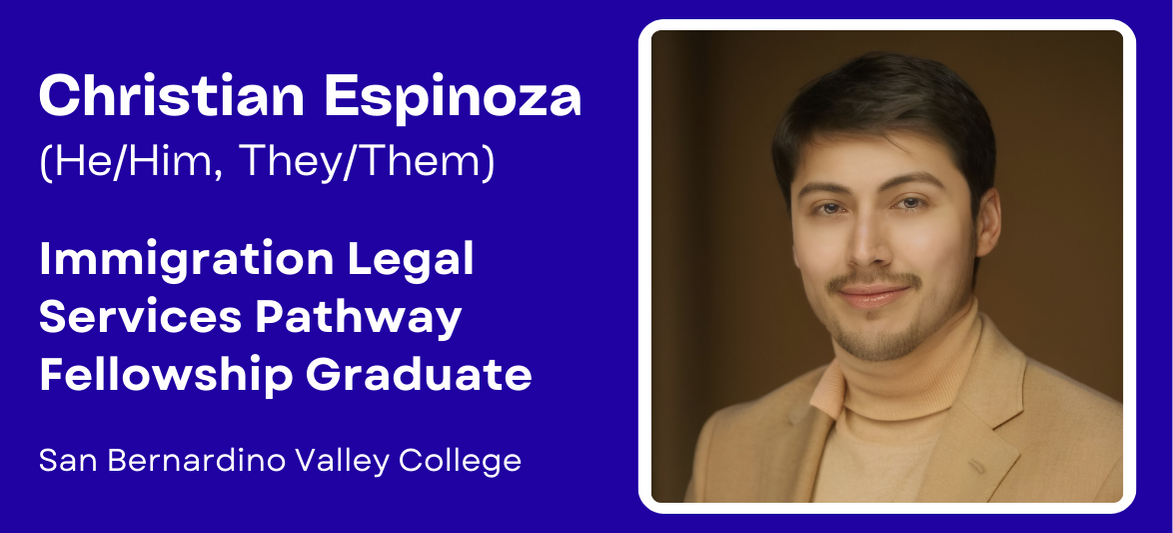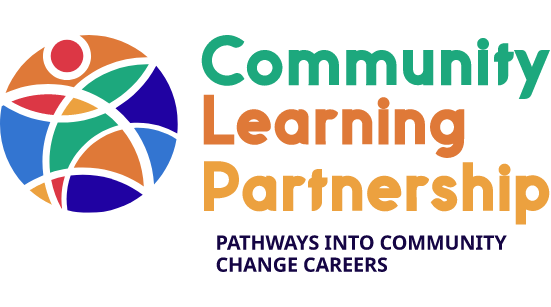
22 Apr Christian Espinoza – San Bernardino Valley College
Christian Espinoza – Student Interview ’24
Immigration Legal Services Pathway Fellowship Graduate – San Bernardino Valley College
We had the pleasure of interviewing Christian Espinoza on their experience in our CYLC learn-and-earn career pathway. They were a student fellow in our Immigration Legal Services Pathway Fellowship Program and graduated in February 2024 and passed CLINIC’s Comprehensive Overview of Immigration Law (COIL). Learn more about his experience in our program and his future goals in pursing law school to further provide support and advocacy for immigrants in their local community.
Tell us about a moment or accomplishment during your fellowship that you are particularly proud of. How did it contribute to the goals of the organization or project you were involved in?
During my fellowship, a moment of significant pride and accomplishment was successfully passing my Comprehensive Overview of Immigration Law (COIL) training and final exam. This achievement was particularly meaningful as it occurred amidst my academic pursuits at San Bernardino Valley College (SBVC) and while I was fully engaged in supporting the staff attorneys at CARECEN. My contributions ranged from document translations and facilitating client-to-attorney communications to conducting legal intakes, updating the eImmigration database, and organizing immigration case paperwork. This milestone was not just a personal triumph but also a significant contribution to the goals of the organization. The skills and knowledge I acquired from the COIL training enhanced my ability to support our legal team more effectively and with greater confidence. My ability to translate complex legal documents and facilitate clear communication between clients and attorneys helped bridge language and understanding gaps, making legal services more accessible to our clients. Additionally, by efficiently managing legal intakes and maintaining organized case files, I helped streamline our case handling processes, allowing our staff attorneys to focus on providing high-quality legal representation. Moreover, my role in updating the eImmigration database ensured that client information was accurate and up-to-date, facilitating smoother case management and supporting the organization’s mission to provide comprehensive legal services to immigrant communities. This accomplishment not only underscored my commitment to supporting immigrants’ rights and access to legal aid but also demonstrated the tangible impact of equipping fellows with in-depth legal training and practical experience.
What are your plans for the future? In reflecting on your fellowship, what key lessons or insights did you gain, and how do you plan to apply these learning’s in your future endeavors or career path? For example, are you excited about starting a new job/career in your field, and or continuing school?
Reflecting on my fellowship experience, I have charted a future path that is deeply rooted in my desire to serve and empower my community. Over the next five years, I plan to apply to UCLA School of Law, a decision inspired by the hands-on experience and the profound understanding of immigration law I gained during my fellowship. My ultimate goal is to return to the Inland Empire, equipped with a law degree, to advocate for and support my community more effectively. The fellowship offered me invaluable lessons and insights, particularly highlighting the critical role that legal expertise plays in advocating for immigrant rights and navigating the complexities of immigration law. It reinforced my determination to pursue a career where I can contribute to meaningful change and support those facing legal challenges similar to those I witnessed and addressed during my fellowship. Passing the Comprehensive Overview of Immigration Law (COIL) training and exam, supporting staff attorneys, and engaging directly with clients have all cemented my commitment to legal advocacy. These experiences have not only prepared me for the rigors of law school but have also laid a solid foundation for my future career in non-profit organizations or educational institutions that focus on college legal services. Upon completing my law degree, I am determined to return to the Inland Empire, where I can leverage my education and experience to make a tangible difference. By providing legal representation, education, and support, I aim to empower those within my community facing immigration issues, ensuring they have access to the resources and advocacy necessary to navigate their legal journeys.
Can you tell us how we did as an organization and partner at your school? What would you improve, what did you like, and what advice would you give to future participants? How can they maximize their learning and make the most of their hands-on opportunities within an organization?
One area that could be improved is the support provided to undocumented students without DACA or work authorization post-completion of the program. Despite earning the Comprehensive Overview of Immigration Law (COIL) certificate, leveraging it in the workforce has been a significant challenge due to my immigration status. Offering guidance or pathways to lend another internship or professional development opportunity after completing the program would be incredibly beneficial for fellows in similar situations. On a positive note, one aspect the organization excelled at was matching me with a local organization that shares my mission and values. This alignment greatly enhanced my fellowship experience, providing me with a meaningful and enriching opportunity to apply my skills and contribute to a cause I am deeply passionate about. To future participants, my advice would be to actively ask more questions and network within the organization. Engaging with as many people as possible, from staff attorneys to fellow interns, can significantly enrich your fellowship experience. These connections not only serve as invaluable sources of knowledge and insight but also begin to weave your network of advocates and support systems. Maximizing your learning and making the most of hands-on opportunities within an organization starts with curiosity and the willingness to step out of your comfort zone to engage with others.
Can you share your social justice origin story? What drives you to do the work in creating social change in your local community?
My social justice origin story is deeply rooted in my identity as an undocumented, queer Latino from a low-income family. Growing up, I encountered firsthand the myriad barriers and injustices faced by communities at the intersection of these identities. These experiences, marked by challenges in accessing education, healthcare, and basic rights, ignited a fierce determination within me to advocate for change. The realization that my struggles were not isolated, but shared by many in my community, transformed my personal grievances into a broader fight for equity and justice. Witnessing the resilience and solidarity of those around me, particularly within undocumented and LGBTQ+ circles, I was inspired to harness our collective experiences as a force for positive change. What drives me is the conviction that no one should have to endure the systemic inequalities that my family and I faced. I am motivated by the potential for a world where everyone, regardless of their immigration status, sexual orientation, or economic background, has the opportunity to thrive. My efforts in creating social change in my local community are aimed at dismantling the structures that perpetuate inequality, advocating for policies that offer protection and empowerment, and building platforms where marginalized voices can be heard and valued. In essence, my journey is fueled by a blend of personal adversity and the powerful examples of community strength and activism I’ve witnessed. These elements have shaped my commitment to fighting for a more just and inclusive society.
What are some of the most pressing issues that need to be addressed in your local community and in society?
In my local community, and indeed in broader society, three pressing issues demand immediate attention and action: the need for affordable legal immigration services, language accessibility, and LGBTQ-centered healthcare. Affordable legal immigration services are vital for undocumented individuals and families navigating the complexities of the immigration system. The high cost of legal assistance often places it out of reach for many in low-income communities, leaving them vulnerable and without guidance. Ensuring access to affordable legal services is crucial in protecting the rights of immigrants and facilitating their path to citizenship or legal residency. Language accessibility is another critical issue. Many members of my community face barriers to essential services, education, and information due to language limitations. Expanding language services and ensuring that all community members have access to information in their native languages is essential for inclusivity, empowerment, and equitable access to opportunities. Lastly, LGBTQ-centered healthcare addresses the unique health needs of the LGBTQ+ community, which often faces discrimination and misunderstanding within the healthcare system. Culturally competent, inclusive healthcare services that respect and understand LGBTQ+ identities are necessary to improve health outcomes and ensure that all individuals feel safe and supported in seeking care.
In what ways did this fellowship experience contribute to your personal and professional growth, and how do you envision yourself applying the skills you have acquired into your local community?
My fellowship experience with CARECEN College Legal Services profoundly contributed to both my personal and professional growth, instilling in me a deep understanding of the legal challenges faced by immigrant communities, especially those intersecting with educational pursuits. This unique exposure not only heightened my empathy and commitment to social justice but also refined my advocacy, research, and community outreach skills. It was during this fellowship that I realized the transformative power of legal expertise in navigating the complexities of immigration law and education policies. Motivated by my experiences and the stories of resilience I encountered, I decided to apply to law school. My ambition isn’t necessarily to become a practicing attorney in the traditional sense. Instead, I aspire to harness the legal knowledge and advocacy skills I will acquire to serve immigrant students within community colleges. Understanding the intricate dance between pursuing immigration relief and accessing higher education firsthand, I aim to bridge this gap for students who find themselves navigating these dual challenges. I envision myself working directly within community college settings, offering guidance, resources, and support to immigrant students. By leveraging my legal expertise, I plan to assist them in understanding their rights, the options available for immigration relief, and how to successfully pursue their academic goals amidst these legal complexities. My ultimate goal is to create a more inclusive, accessible, and supportive educational environment for all students, irrespective of their immigration status, ensuring that the pursuit of higher education is a realistic and achievable dream for everyone.
